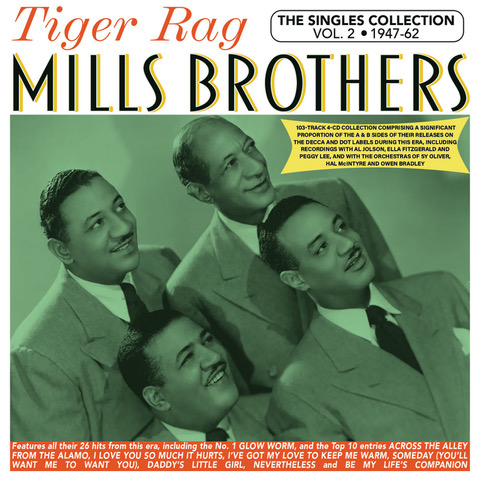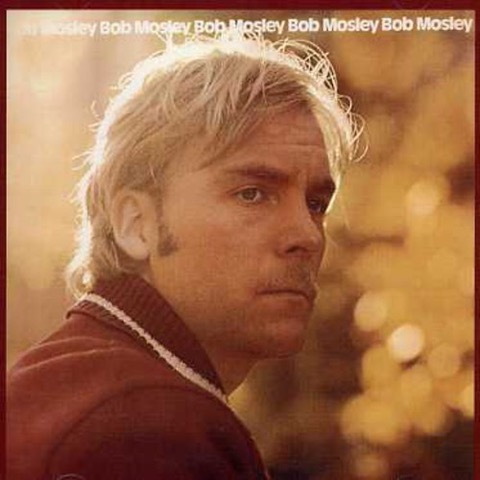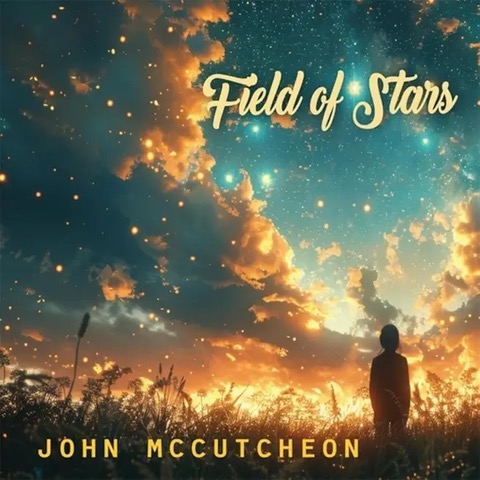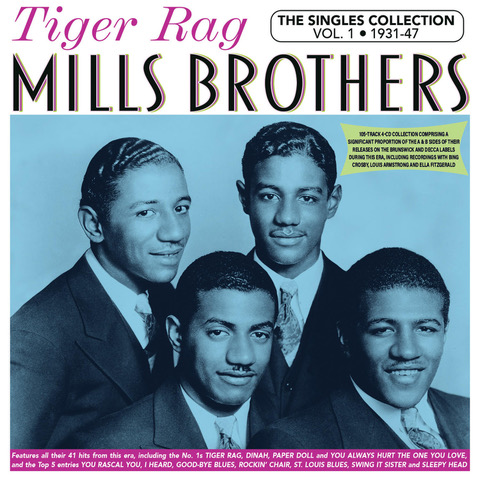You’re not likely to find a Mills Brothers entry in any rock encyclopedia, and it’s a good bet that their name would ring no bells with most music fans today. Nevertheless, this pop and jazz vocal quartet ranks among the most significant progenitors of early rock and roll and doo-wop. They easily contributed enough to popular music to merit the Lifetime Achievement Grammy Award that they received in 1998.
Commercially, they were huge – the most popular male vocal group of all time by some measures. During a career that spanned over half a century, they issued thousands of singles and albums, sold more than 50 million records, and were the first black singers to host a network radio show. They had hits in every decade from the 1930s to the 1960s.
The appeal of the Mills Brothers, who hailed from the Dayton, Ohio, suburb of Piqua, stemmed partly from the excellence of their material and partly from their consummate barbershop quartet vocals. (Their father, who performed with his sons after one of them passed away, owned a barbershop and had his own quartet.) They also gained notice for their ability to mimic musical instruments, including trumpet, trombone, and tuba, with their voices. In fact, their imitations were so good that the labels on some of their early records included a disclaimer: “No musical instruments or mechanical devices used on this recording other than one guitar.” (They did, however, add a variety of instruments on some of their later tracks.)
Given the length of the Mills Brothers’ career and the extent of their success, it’s not surprising that their work has been frequently anthologized. But none of the previous compendiums outshines a pair of new four-CD releases, Tiger Rag: The Singles Collection Vol. 1 1931-47 and Tiger Rag: The Singles Collection Vol. 2 1947-60. Embracing all the important 78s and 45s from the group’s peak years with the Brunswick, Decca, and Dot labels, these sets feature 186 selections and nearly eight-and-a-half hours of music. Each collection comes with a 24-page booklet that contains discographic information and a lengthy new essay about the quartet’s career and influence.
Volume One opens with 1931’s playful “Tiger Rag,” the Mills Brothers’ first smash, and its flip side, “Nobody’s Sweetheart,” which also provided a big hit. Other early successes featured here find the group teamed with Bing Crosby (“Dinah” and “Shine,” both from 1932), Ella Fitzgerald (1937’s “Big Boy Blue”), and Louis Armstrong (1940’s “W.P.A.”). Also on the program are such major hits as “You Rascal You,” “I Heard,” “St. Louis Blues,” and “Bugle Call Rag,” from 1932; “Swing It Sister” and “Sleepy Head,” from 1934; “Sixty Seconds Got Together,” from 1938; the dreamy “Paper Doll,” from 1943, which was the first record by a black act to top Billboard’s singles chart; and the World War II–influenced “Till Then,” from 1944.

Volume Two adds such hits as “I Love You So Much It Hurts,” “I’ve Got My Love to Keep Me Warm,” and “Someday (You’ll Want Me to Want You),” from 1949; “Nevertheless (I’m in Love with You),” from 1950; “Be My Life’s Companion,” from 1952; and “Opus One” and “Smack Dab in the Middle,” from 1955.
Also here is a version of “Get a Job” that made it to No. 21 on the charts and that underscores the Mills Brothers’ connection to doo-wop. By the time of its 1958 release, the group’s star had finally begun to fade, which may explain why the recording didn’t fare quite as well as the Silhouettes’ chart-topping version from the same year. Be that as it may, the vocalizing is undeniably superior in the brothers’ rendition.
Also Noteworthy

Bob Mosley, Bob Mosley. Is there a sadder story in rock music than that of Northern California’s Moby Grape? The eponymous first album from this multitalented and influential five-man outfit, which appeared in 1967, ranks among the best debut LPs of its decade. However, when Columbia Records simultaneously released five excellent singles from it, a sense that the group had been overhyped hurt its reputation. Other reasons its career stalled included its omission from the Monterey Pop film, legal fights with its former manager, and the mental illnesses of two of its members, Skip Spence and Bob Mosley.
While the latter’s paranoid schizophrenia led to periods of homelessness, however, the now 81-year-old bassist and singer has managed to perform and sporadically release albums during the decades following Moby Grape’s demise. Mosley – whose contributions to his former band included such standouts as “Mr. Blues,” “Come in the Morning,” and “Bitter Wind” – delivered particularly strong performances on his self-titled solo debut. The album, which came out in 1972, was reissued in 2005 but has never found the audience it deserves.
Perhaps that will change with its latest reissue, which features remastered audio and a remix by songwriter and label owner John DeNicola that puts more emphasis on drums and Mosley’s bass. Featuring a potent backup band, the album showcases 11 Mosley originals (one co-written with his brother, Andy). Standouts include the soulful “Gypsy Wedding,” which prominently employs the Memphis Horns, the hard-rocking “The Joker,” which incorporates guitar work redolent of Jimi Hendrix; and “Gone Fishin’,” which starts as a gentle number about putting anxieties aside with rod and reel but builds into a propulsive rocker about encounters with the opposite sex.

John McCutcheon, Field of Stars. Veteran folkie John McCutcheon, whose baritone and musical approach recall Tom Paxton, managed to issue three albums during the pandemic: Leap!, which he offered as a pay-what-you-wish download, “knowing that there are many who’ve lost their jobs and their incomes”; Together, a collaboration with Paxton that resulted from weekly songwriting sessions over Zoom; and Cabin Fever, which McCutcheon recorded while quarantining in a Georgia log cabin. Despite all that, he did shelve one full-band project that had been intended for release in 2020.
Called Field of Stars, this 45th McCutcheon LP has finally been completed and issued. Highlights include “Here,” a song about living in the moment that he wrote with Carrie Newcomer; and the title cut, another song co-authored with Newcomer, on which she shares vocal duties. Also memorable are “MS St. Louis,” about the ship full of Jewish refugees that Cuba, Canada, and the U.S. turned away in 1939; “The Only One Dancing,” a sentimental, romantic number that McCutcheon wrote with Zoe Mulford and sings with bluegrass artist Claire Lynch; and the lighthearted “Too Old to Die Young,” which he composed for his 70th birthday.
Jeff Burger’s website, byjeffburger.com, contains five decades’ worth of music reviews, interviews, and commentary. His books include Dylan on Dylan: Interviews and Encounters, Lennon on Lennon: Conversations with John Lennon, Leonard Cohen on Leonard Cohen: Interviews and Encounters, and Springsteen on Springsteen: Interviews, Speeches, and Encounters.



